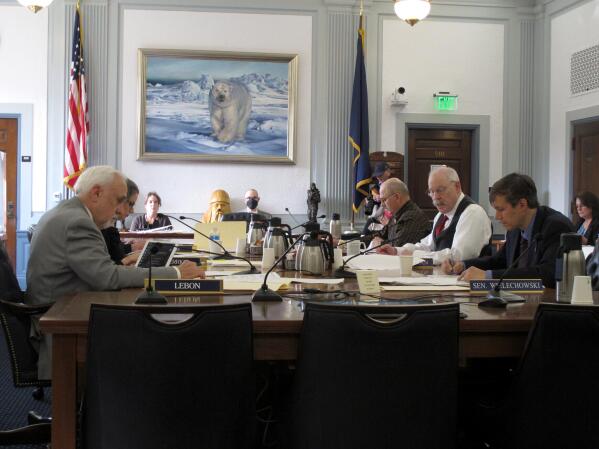Alaska House, Senate negotiators reach tentative budget deal
JUNEAU, Alaska (AP) — Alaska lawmakers tasked with negotiating a budget deal reached a tentative agreement Tuesday that would pay residents more than $3,000 this year, but the final amount would depend on whether the Legislature can muster the votes needed to access a key savings account.
The tentative agreement calls for a dividend from the state’s oil-wealth fund in the range of $2,500 this year, plus a $1,300 “energy relief” check. However, half the funding for the energy check would come from a budget reserve account that requires three-fourths support in each the House and Senate to access.
Payments to residents could be around $3,200 or they could be around $3,850 depending on whether the vote threshold is reached, according to estimates shared with reporters by Senate Finance Committee co-Chair Bert Stedman’s office.
Stedman, a Sitka Republican, chaired the conference committee, which met for the first time Sunday and announced the tentative agreement Tuesday, the day before the legislative session was scheduled to end. The negotiated package is subject to a vote by the House and Senate.
Stedman said the budget is a good one, with a “healthy dividend,” capital projects around Alaska and attention to K-12 education and the university system. He said the dividend is a “sensitive issue” to negotiate, with splits among lawmakers over what the size should be.
The House in its version of the budget approved a dividend of about $1,250 plus a $1,300 energy check. The Senate Finance Committee, in the version of the budget it sent to the Senate floor, proposed a roughly $2,500 dividend.
The Senate version of the budget, however, was amended during floor debate to include a dividend of about $4,200 this year from the earnings of the Alaska Permanent Fund, an amount in line with a long-standing dividend formula last used in 2015, along with a $1,300 energy check.
The House rejected the Senate package Saturday, which led to the appointment of House and Senate negotiators tasked with trying to reach a compromise spending bill.
Many lawmakers consider the formula unsustainable, particularly since the state has come to rely on permanent fund earnings, long used to pay dividends, to also help fund government. But lawmakers have not agreed to a new formula and instead have been setting the yearly amount, resulting in often drawn-out, divisive debates. Last year’s check was $1,114.
When lawmakers began using permanent fund earnings to help pay for state expenses, they sought to limit how much money could be withdrawn each year for dividends and government. The limit is based on a percentage of the fund’s market value. The draw for the upcoming fiscal year is about $3.4 billion.
Gov. Mike Dunleavy has called for an approach that would split what is drawn 50/50 between dividends and government. A roughly $2,500 dividend is in line with that approach. He also called for a supplemental dividend of about $1,250, citing high fuel and food costs.
Sen. Bill Wielechowski, an Anchorage Democrat, supported the higher dividend passed by the Senate. But he said the amount the conference committee settled on was “the best we could get.” Wielechowski was on the conference committee.
He said the lesson that’s been reinforced this year is the instability surrounding the dividend. “It’s become political, and it will remain political until we put it into the constitution,” he said.
Dunleavy and many lawmakers have talked about the need for a long-term resolution on the dividend. Heading into this session, there was talk about the need for a state fiscal plan following years of low and middling oil prices and deficits. That talk was tempered by a rosier revenue forecast, spurred by higher oil prices. A bill that proposed a new dividend formula faltered in the Senate.
Stedman said people sometimes focus on the check size but it’s the total cost that can be a challenge. A roughly $4,200 dividend and $1,300 energy check would have cost an estimated $3.6 billion. The cost of a roughly $2,500 dividend and $1,300 energy check is about $2.5 billion.
Senate Minority Leader Tom Begich, an Anchorage Democrat, said he supports the conference committee proposal, citing in part concerns with high energy costs, particularly in rural Alaska.



